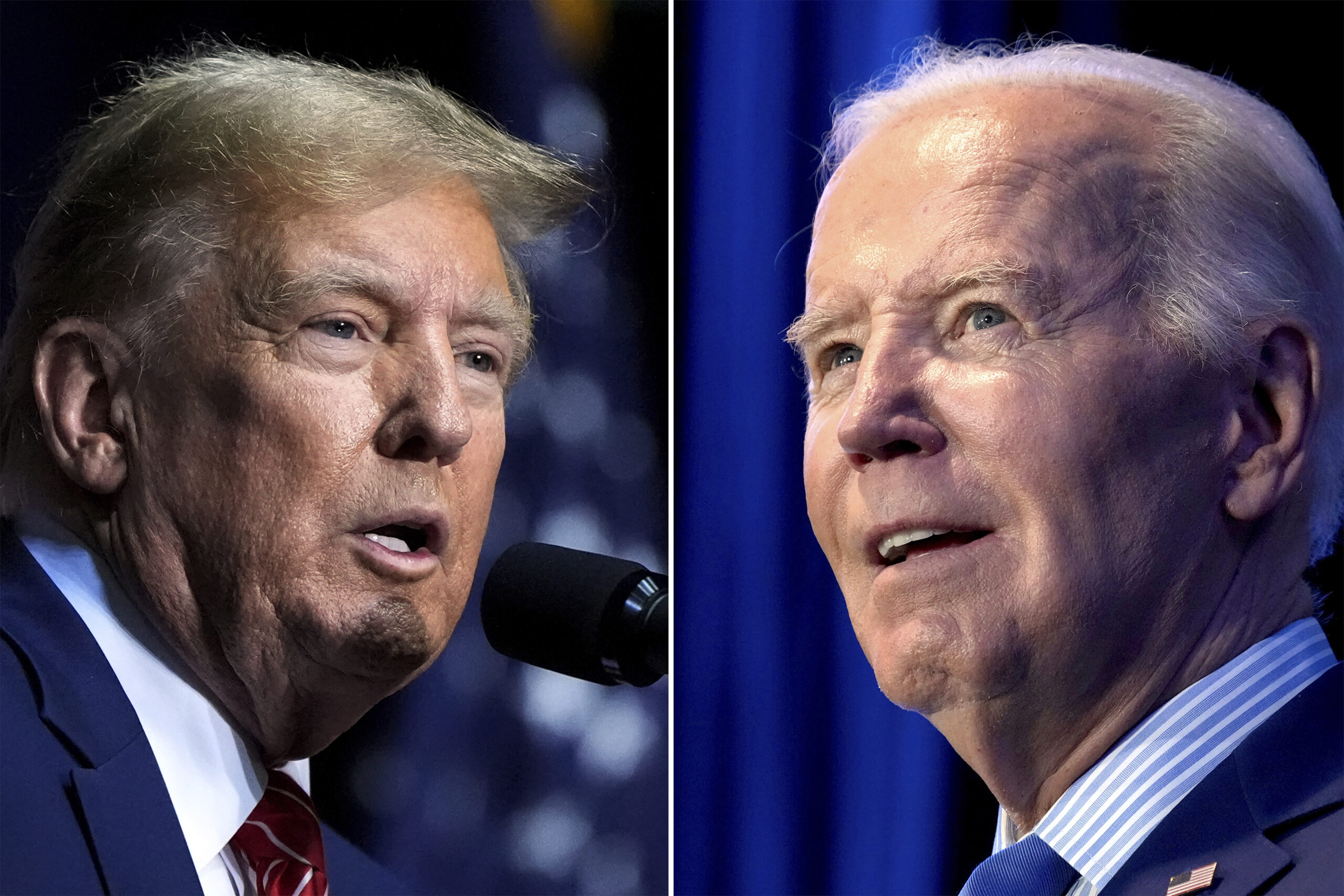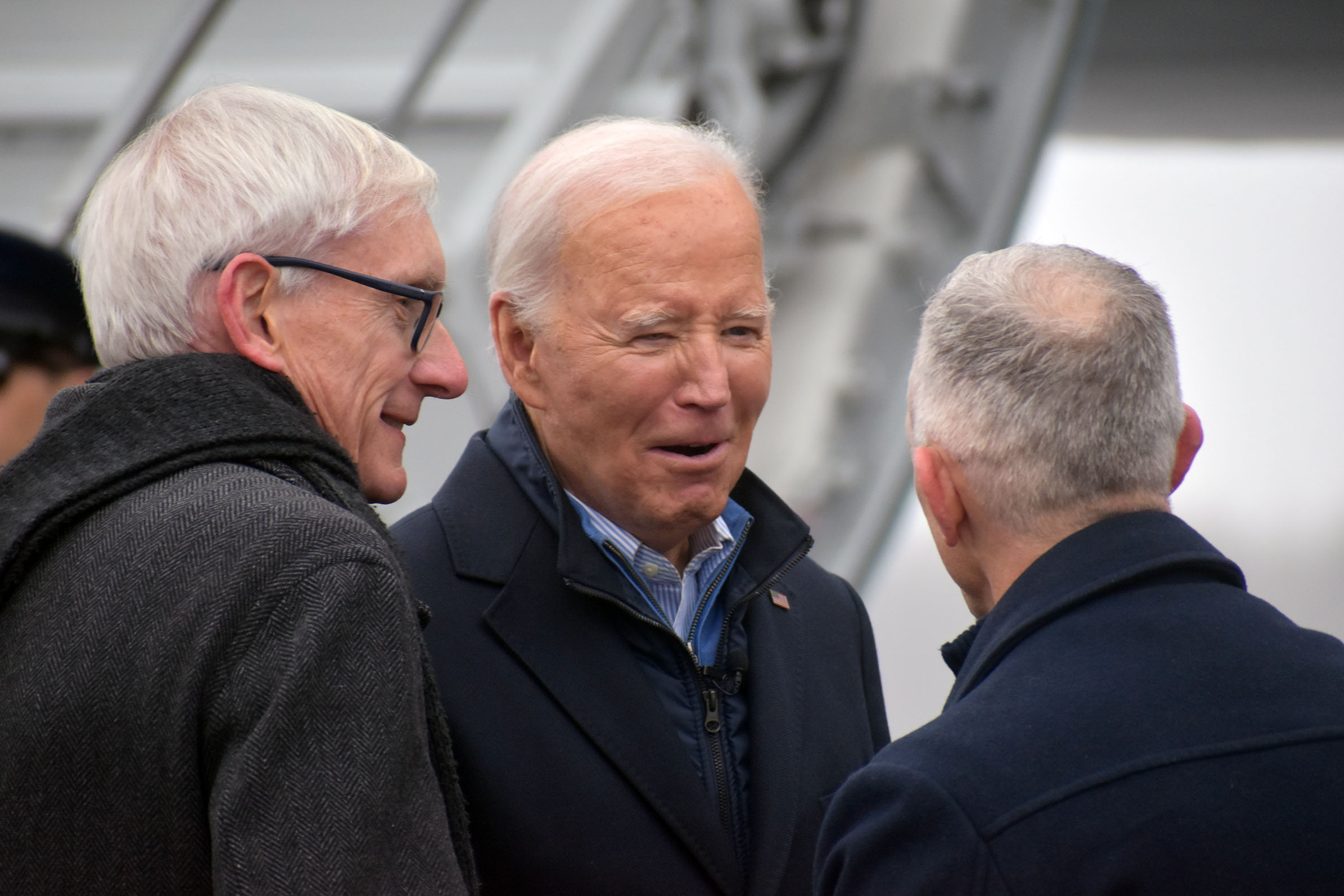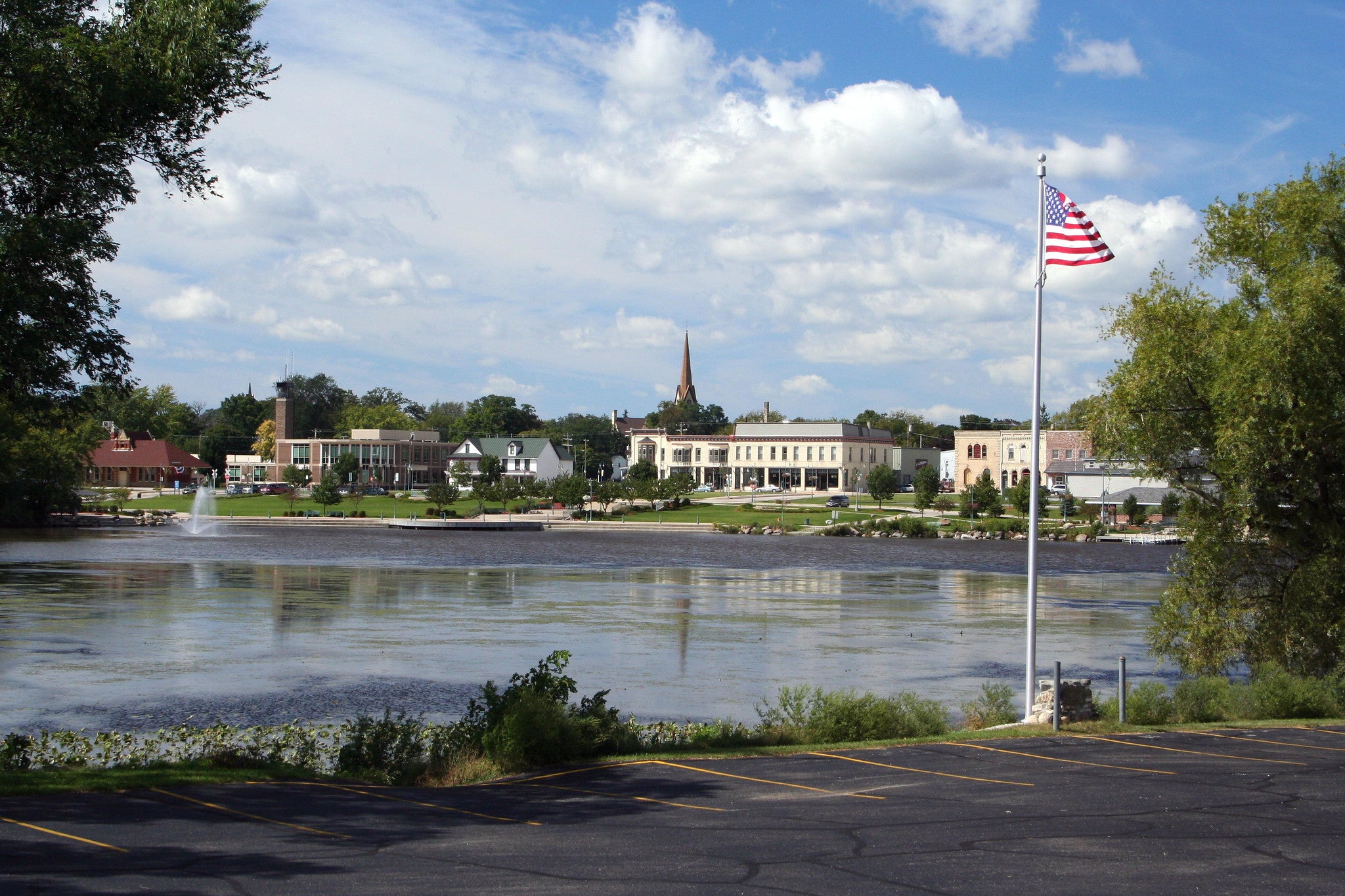People define “American” in a lot of different ways, from citizenship, to religion and language. We hear about a new survey that finds a surprising amount of agreement on what it means to be an American. Five German police officers are currently spending time in Altoona, Wisconsin as part of an international officer exchange program. We find out what both sides are hoping to learn. Plus, we get an update on where state budget negotiations stand, with a spending plan more than a month overdue.
Featured in this Show
-
Police Exchange Program Brings 5 German Officers To Wisconsin
Altoona Police Officer Edward Bell grew up in Germany and moved to the U.S. in 2010 to become a police officer. He noticed that law enforcement officers in Wisconsin and in Germany deal with many of the same problems, but with much different approaches. So, he decided to organize an exchange for police officers from German police departments to spend some time in Wisconsin.
“I figured it would be a great opportunity for us to get together … and examine that and look at that and see that there’s different approaches to (policing),” Bell said.
When he brought the idea to his superiors, Bell said his chief and lieutenant were both immediately on board.
“I did not run into a single person that didn’t want to be part of this, and that goes as far as the civilians here that have met the officers so far in the community,” he said.
The five participating officers from Germany are staying with the families of officers in the area. Bell said the key point of the program is ride-alongs. The officers participated in ride-alongs with seven law enforcement agencies in Eau Claire and Chippewa counties. They’ve also toured correctional and judicial facilities to see how law enforcement work is handled once it advances in the U.S. judicial system.
“We’re just trying to show off as many aspects of our law enforcement culture as we possibly can,” Bell said.
The exchange has brought many institutional differences to light. Bell said that in Germany, law enforcement is organized at the state level, whereas in the U.S., it’s organized on a local level.
There are also different perceptions of police in each country. One example Bell had was patrol work. When American police officers stop into a restaurant to eat, the owners are often appreciative of their presence.
“In Germany, it seems like sometimes (the restaurant owners) might say, ‘Well, that person’s being paid and they’re eating right now,’ so the cultural perception of law enforcement is very different on both sides,” he explained.
Another difference between German and Wisconsin police departments is in handling drunken drivers. Bell said there are much larger groups of officers that organize in teams and work to combat drunk driving in Germany. He said it’s interesting to see how different the level of training and structure is when you compare the departments.
While in Wisconsin, all of the German police officers were able to participate in a National Night Out event in Eau Claire. These are events where police officers meet with community members to help build trust and camaraderie. The events can include block parties, festivals or cookouts. Bell said the German officers were very interested in the idea and would love to implement it in their own communities.
“There was very positive feedback from them to see how many people come out and try to speak with us and to interact with us there,” he said.
The officer said one thing Wisconsin’s officers could learn from the German police officers is how to better react to larger incidents, like riots. He explained that because everything is organized on a larger scale in Germany, the officers are more experienced when it comes to dealing with or deploying for these bigger incidents.
The Star International Police Exchange Program has four members countries: the U.S., Germany, Spain and Switzerland. Bell said the first exchange has been such a big success that he’d like to make it a regular event for the department.
“We are planning on making this an annual event, an annual exchange, and we’d like to grow with that a bit and include some more agencies in the area,” he said.
He added that he’d like to include sending Wisconsin police officers abroad.
-
Police Exchange Program Brings German Officers To The Chippewa Valley
Altoona, Wisconsin recently welcomed some unique visitors to the city. Thanks to an international exchange program, five German police officers recently came to the Chippewa Valley, and are currently embedding with local police. A member of Altoona’s police department explains how the exchange came about, and what both sides are hoping to learn from it.
-
What Makes Us American (According To Americans)
People define “American” in a lot of different ways–by language, religion, citizenship, and more. In a new survey, a guest finds a surprising amount of agreement when it comes to defining American identity.
-
What Makes An American An American?
What makes an American an American? Is it a person’s belief in the values of democracy and democratic institutions? Or, does their race, creed and ethnicity make a person an American?
These were questions the Voter Study Group aimed to tease out in a survey conducted after the divisive 2016 general election.
There are two lenses to examine the “American” question: ethnic identity or civic identity, said John Sides, an associate professor of political science at George Washington University and researcher with the Voter Study Group.
“If we think about citizenship or American identity in terms of ethnicity, we’re going to look at who people are,” he said. “We’re going to ask, ‘Where are you from? What’s your skin color? What’s your religion?’”
But Sides, who is also the editor-in-chief of “The Monkey Cage” blog for the Washington Post, noted that when it comes to a civic identity, the questions take on a different tone.
“We’re going to ask you, ‘What do you believe?’” he said. “‘Do you support American values? American ideals? American institutions?’… things like that.”
The 2016 VOTER Survey, also called the Views of the Electorate Research Survey, found most respondents believed a person’s civic beliefs were far more important in determining whether or not they were American than one’s racial, ethnic or religious background.
Sides said for many of the 8,000 people surveyed, what made someone an American included whether someone was an American citizen, whether they respected American political institutions and laws, and were accepting people of racial and religious backgrounds.
“Some of those things, I think, are really probably at the core of who we think we are as a country, our ideals,” he said. “(These ideals) not only include the democratic institutions that we have but also includes this ideal of accepting people of diverse backgrounds.
And a large majority of both Republicans and Democrats think those things are important for being an American,” Sides said.
When it came to supporting American institutions and laws, there was somewhat of a consensus regardless of one’s political leanings. The VOTER Survey found 93 percent of Americans overall think supporting American institutions and laws is important. Broken down, Sides said, it averages to 90 percent of Democrats and 97 percent of Republicans.
Given the ongoing narrative about partisanship and the polarization of the United States, one might think these results were surprising to researchers. But Sides said the results show there seems to be broad agreement that these ideals are important to an American identity. However, Sides does concede there are some nuances absent from these answers.
“You could certainly say that the devil’s in the details in terms of which political institutions and laws. Or, which kinds of racial and religious backgrounds,” he said. “But I do think that these things are, and have been for quite some time, really at the core of what Americans think about who they are.”
He points to the early documents and the political rhetoric of the Founding Fathers as setting the foundation for our American ideals today. He said the core beliefs set forth by the founders had more to do with the formation of democratic institutions and laws, as opposed to establishing something such as a state religion.
Religion’s Role In Identity
The U.S. doesn’t have a state religion as mandated in the First Amendment of the Constitution, but the freedom of religion has been a crucial part of many people’s belief in America and their role as Americans.
One question asked in the survey was whether being a Christian was an important part of what it means to be an American. Sides said about 42 percent of respondents answered that being a Christian was important for being an American. However, he noted that while this didn’t make up a majority of those surveyed, the answers do show an interesting pattern along political lines.
“Among Republicans, for example, about 56 percent of them think this is an important criterion,” He said. “But only 30 percent of Democrats think that. And Trump primary voters were a little bit more likely even than Republicans as a whole to support this.”
He said this question gets to the heart of other conversations happening in the country today. Namely, the division and anxieties over Muslim immigration and assimilation in the United States. Conversations around assimilation can be fraught much of the time and this is particularly true when we talk about language.
Respondents Value English Language
The United States doesn’t have an official language. But, English is the most common language spoken in the country, and some states, such as Arizona, have made it as their official language.
In the VOTER Survey, the respondents were asked about whether speaking English is a necessary part of an American identity. While there wasn’t a consensus, many respondents did say that speaking English was important. Sides said 85 percent of Americans said it was important. Along party lines, those numbers do shift with nearly 96 percent of Republicans saying it’s crucial, compared to 75 percent of Democrats.
“One of the things that have been true in the United States as we’ve admitted large numbers of immigrants from a variety of countries stretching back over the last couple hundred of years, I think having a common lingua franca has been integral to the goal of forming one people out of these many different groups,” Sides side. “I think Americans today seem to retain a belief that having that is important.”
Sides went on to say there doesn’t seem to be a consensus about whether English should be the only language spoken in the country, but many people see English as a way to communicate more broadly.
Racial Heritage Not Important To American Identity
The VOTER Survey also made the point to ask respondents whether one’s racial heritage was crucial to an American identity. Namely, whether being of European heritage or descent was an important criterion. Sides said this question yielded the smallest support of all of the questions. He said only 20 percent of Americans noted this as important.
“(Twenty percent) is low relatively speaking,” he said. “Whether that’s low or high in absolute terms, of course, will depend on your perspective.”
He said this was also not embraced by either party, with 17 percent of Democrats and 23 percent of Republicans saying it’s an important factor in an American identity.
“I think both groups, in some sense, are rejecting, what I think, is the most overt and exclusive way of defining American identity,” Sides said. “At least in the list of criteria that we gave to people.”
Republicans, Democrats Find Common Ground
Other criteria considered in the survey was whether having American citizenship made someone an American and, asked separately, whether being born in America was important. On being born in America, only about 55 percent of respondents said this was important with slightly more Republicans being in favor compared to Democrats. But having American citizenship was seen as very important for both of the major parties, with about 90 percent of respondents saying it was important.
Sides said that he believes that for respondents American citizenship is inherently very inclusive.
“We offer citizenship to people who are immigrants, obviously there’s a process in doing so, but relative to other countries who have been more exclusive in their conception of who can get citizenship,” he said.
While there is birthright citizenship in the United States, the country has been more open to immigration historically.
While many people would argue that the country is divided, certainly along party lines, the survey shows there can be common ground. For researchers Sides, he said conducting polls and surveys can help bring complex ideas and opinions to the forefront.
“I wanted to highlight (through this research) that there are divisions but there are areas of consensus,” he said. “So, it is possible to have a conversation about core issues in this country and the meaning of American identity itself without it devolving into an argument. It just depends on the conversation we’re asked to have.”
Episode Credits
- Rob Ferrett Host
- Veronica Rueckert Host
- Chris Malina Producer
- Rob Ferrett Producer
- Edward Bell Guest
- John Sides Guest
Wisconsin Public Radio, © Copyright 2024, Board of Regents of the University of Wisconsin System and Wisconsin Educational Communications Board.




